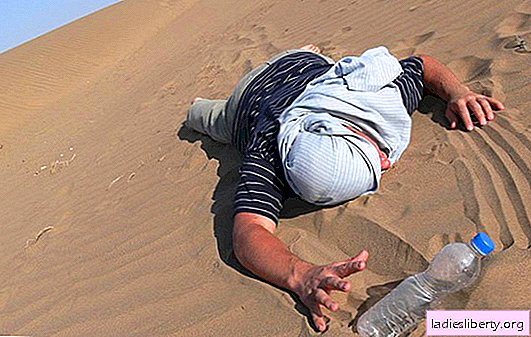
Man is more than 75% water.
This liquid performs a lot of functions in the body, so it should regularly receive the necessary amount of water.
How long will you live without water, is it true that you die in a week?
Before giving an answer to this question, you need to understand what exactly water is for a person.
In the body, water performs the following functions:
1. Supports all systems and organs of a person in working condition.
2. Regulates overall body temperature.
3. Dissolves oxygen, so that a person can breathe.
4. Removes digested foods after metabolism.
5. Helps in transporting vitamin, mineral and various trace elements.
6. Promotes detoxification.
7. Makes the muscles contract.
8. Carries electrons throughout the body.
9. Does not allow dehydration, so the brain can function normally.
If a person with good health is placed in good climatic conditions, on average, he will be able to live seven days without water. Moreover, every day his condition will worsen.
The primary signs of dehydration (stage 1) are:
• a feeling of dry mouth;
• thirsty;
• darkening of urine.
In the second stage of dehydration (2-4 days), a person may experience the following symptoms:
• itching and dry eyes;
• joint pain;
• violation of the rhythm of the heartbeat;
• weakness due to slowed blood circulation;
• diarrhea.
In the last stage of dehydration, a person suffers from such manifestations:
• complete cessation of urination;
• nausea;
• drowsiness, retardation of consciousness, aggression and other disorders in the functioning of the central nervous system;
• lethargy;
• shock state;
• blue skin and death.
With severe dehydration, the density of blood and its fluidity are disturbed. Because of this, the kidneys, heart and brain, which are most in need of nutrients, suffer greatly.
In addition, with excessive blood density, much less oxygen will enter the body (cells will not be able to quickly transport oxygen through the body). It is for this reason that a person will live less without water than without food.
How many people can live without water?
According to research, an unprepared person at an air temperature of 18-20 degrees can live without water for about eight days. At the same time, the situation changes dramatically if the body remains without water under the scorching sun. In this case, he will be able to live no longer than four days.
Famous scientist E.F. Adolf studied the influence of the environment on the rate of excretion of water from the body. He found this:
• if a person is in the shade at a temperature of 16 to 20 degrees and is not engaged in physical activity, then he may not drink up to ten days;
• if a person stays at a temperature of 29 degrees, then he will live without water for up to seven days;
• at a temperature of more than 35 degrees without water, a person can live no more than two days.
In addition, if a person also actively moves during dehydration, then he will quickly lose time, since when the muscles work, the rate of water consumption by the cells increases significantly.
Such indicators are justified by the fact that in just 1 day hundreds of liters of water flow through the human brain, and even more through the kidneys. This enables all systems to work seamlessly. When a person does not receive the required amount of liquid, then he rapidly loses all the minerals and trace elements necessary for life. Thus, tissues and nerves do not receive "food" to support life and die.
In 1985, a nine-year-old boy was found under a destroyed building, who stayed there for thirteen days without food and water. After salvation, the child survived and was able to restore strength.
Another incredible incident was recorded in 1947, when rescuers found a 53-year-old man in an abandoned house. The victim remained without water and food for sixteen days.
According to the Guinness book, the longest time without water was managed by an Australian who was locked up in the cell by the police and forgot that he was there. That man was imprisoned for eighteen consecutive days without food and water and remained alive. The secret of this phenomenon is simply explained: in the dungeon it was damp and cold, so the body did not lose moisture so quickly. Only this fact saved the prisoner from imminent death.
These facts indicate that, despite statistics, in an emergency, the human body can survive even in the most difficult conditions.
How long you live without water depends on what you do.
It is important to know that water from the human body can be excreted not only through urine, but also through sweat, and even breathing. On a sunny day, at an air temperature of 27 degrees in an adult, together with then only one liter of water comes out in just a day.
Due to the intense heat, body temperature rises all the time, so if there is not enough fluid in the body, then a person can easily die from overheating or heart attack. Water plays the role of cooling. It keeps the temperature normal.
Like any living creature, the human body works all the time (even at night). As a result of this, he constantly needs useful trace elements and fluids. For the normal functioning of all systems, you need to drink at least two liters of water per day (not counting juices, compotes, soups, etc.).
In addition, if a man or woman is engaged in vigorous physical activity, then they need to drink more water, as the flow rate will be faster.
If you accidentally get into an emergency in which there will be no access to water, you can use the ancient method of survival. It consists in putting a rounded pebble in your mouth. In this case, you need to breathe with your nose, and not your mouth, so that more moisture is retained in the body. Thus, sucking a pebble will contribute to the release of saliva and help temporarily forget about thirst.
A normal balance of fluid in the body should always be maintained, since water is the basis of life.











